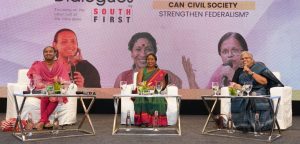Social activist Brinda Adige made this statement at a panel discussion during Dakshin Dialogues 2022, organised by South First in Hyderabad.

Social activist Brinda Adige speaks during Dakshin Dialogues 2022. (South First)
Social activist Brinda Adige on Saturday, 17 September, said a civil society that refuses to be complacent with power is the answer to strengthening federalism.
She made this statement at a panel discussion during Dakshin Dialogues 2022, an event organised by South First in Hyderabad. The panel discussion was on the topic “Civil society movements: Can they strengthen federalism?”
The other panellist at the discussion was Meera Sanghmitra, who is also a social activist. The discussion was moderated by the retired Osmania University professor Padmaja Shaw.
“More people from civil society still require information… It is the civil society, enlightened civil society, a civil society that refuses to be complacent that is the answer to strengthening federalism,” said Brinda Adige when asked if civil societies could strengthen federalism.
She added that none of the institutions — neither the elected representative, nor the bureaucracy, nor even the courts — are doing what they are meant to.
“Civil society is being forced to come out of its comfort zone to keep federalism alive,” said Adige.

From left: Social activists Meera Sanghamitra and Brinda Adige participate in a panel discussion with Prof Padmaja Shaw at South First’s Dakshin Dialogues 2022 in Hyderabad on Saturday, 17 September, 2022. (South First)
“We have this women’s group in Hyderabad. Whenever anything happens, our women’s group are on the streets, filing police cases, protecting the victim, and arguing for them. And social media asks ‘Where are the feminist?'” said Shaw.
“In civil society, we have to include ourselves. When something wrong is happening, you come out on the streets. That’s how civil society will work,” she added.
Sanghmitra said during the panel discussion: “If all of us will not be part of deepening democracy, we are not going far. If we have come this far after 75 years, it is because of the efforts of so many people to deepen democracy.”
She added: “Civil societies and mass organisation have been a part of federalism. Civil society has always been a part of defending federalism. We need to do much more and get more solidarity to strengthen federalism.”
Meanwhile, Adige said: “Civil society, as we know it, is like our homes. It is largely run by women. Whether it is your home or community, it is the women who are propelling it.”
She added: “There will be patriarchal elements that will say families are breaking up or children are not growing up well because of these women. They left conventional society and started to demand that kitchen be a very sacred place for women. Meanwhile, civil societies are also asking for representation in Parliament. It is not charity. It is our right. Another 50 years, and there will be more women everywhere. There will be peace. And federalism will certainly be there.”
Sanghmitra said that to garner the support from a whole lot of political actors in times of fascism, when Central probe agencies are at the beck and call of the ruling party, “We need to reflect.”
She added: “Political parties engage differently. There is arithmetic. We have to sustain federalism. It requires a lot of effort in the democratic framework, and civil society is there to sustain federalism.”

Oct 17, 2023

Oct 13, 2023

Oct 13, 2023

Oct 13, 2023

Oct 11, 2023

Oct 11, 2023